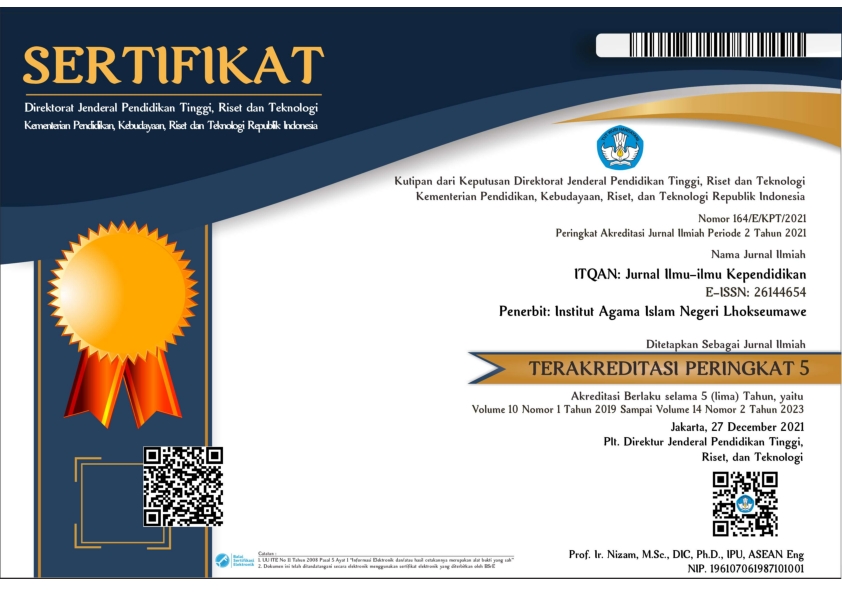Kepemimpinan Pendidikan Kepala Sekolah dalam Perspektif Al-Qur’an
Main Article Content
Zulkhairi Zulkhairi
The research discusses the theory of spiritual leadership and Islamic teachings, and transposes the theoretical components of the spiritual leadership model into an Islamic leadership model that is more suitable for Islamic educational institutions. The research tries to find the concept of leadership in the perspective of the Qur'an. The research method is qualitative type. The technique used is literature study. Data were collected through relevant studies. The results of the study show that leadership in Islam is the term caliph, Imam, and Ulil-Amri; the concepts of caliph, imam, and ulil-Amri are very relevant to leadership in organizations; Surah Al Maidah verse 2 contains various lessons that are important to be absorbed and practiced by every Muslim, especially leaders in society, educational institutions. The context of leadership in society and educational institutions is to increase self-awareness, emotional and social interaction, communication, and daily interactions in the work environment, business and social activities of the community.
Alister, N. B., Amanda, C., Leithwood, D. K., & Livingstone, D. (2005). International Handbook of Educational Policy (N. Bascia, A. Cumming, A. Datnow, K. Leithwood, & D. Livingstone, eds.). https://doi.org/10.1007/1-4020-3201-3
Ather, S. M., & Sobhani, F. A. (2007). Managerial Leadership: an Islamic Perspective. IIUC Central Library Repository. Retrieved from http://dspace.iiuc.ac.bd:8080/xmlui/handle/88203/119
Avolio, B. (1999). Full Leadership Development: Building the Vital Forces in Organizations (M. A. Vail, ed.). California: Sage Publication.
Chan, S. C. H. (2019). Participative Leadership and Job Satisfaction. Leadership & Organization Development Journal.
Crockett, J. B., Billingsley, B., & Boscardin, M. L. (2012). Handbook of Leadership and Administration for Special Education. Routledge.
Dacholfany, M. I. (2015). Leadership Style in Character Education at The Darussalam Gontor Islamic Boarding. Al-Ulum, 15(2), 447. https://doi.org/10.30603/au.v15i2.212
Irfan, M. (2021). Gaya Kepemimpinan Kepala Madrasah Dalam Peningkatan Mutu Pendidikan (Studi Kasus Kepemimpinan Transformasional di MTs N 2 Bandar Lampung). UNIVERSITAS ISLAM NEGERI RADEN INTAN LAMPUNG.
Istikomah, I. (2019). Efektivitas Kepemimpinan Kepala Sekolah Pada SMK Negeri 4 di Kota Jambi. Idarah (Jurnal Pendidikan Dan Kependidikan), 3(2), 39–55. https://doi.org/10.47766/idarah.v3i2.560
Kartono, K. (2018). Pemimpin dan Kepemimpinan. Rajawali Pers.
Mastuhu. (2008). Sistem Pendidikan Visioner (2nd ed.). Tangerang: Lentera Hati.
Maulida, P., Ariyanto, S., & Zulkhairi, Z. (2019). Peran Kepemimpinan Kepala Sekolah dalam Pelaksanaan Evaluasi Pembelajaran di SMA Negeri 1 Syamtalira Bayu. Idarah (Jurnal Pendidikan Dan Kependidikan), 3(1), 66–85. https://doi.org/10.47766/idarah.v3i1.613
Misbah, M., Sulaeman, S., & Bakhri, S. (2019). Role of Leadership in Organizational Change: A Case Study at Attaqwa Putra Islamic Boarding School Bekasi-Indonesia. Asian Journal of Contemporary Education, 3(1), 72–84.
Mukhtar, H., & Prasetyo, M. A. M. (2020). Pesantren Efektif Model Teori Integratif Kepemimpinan–Komunikasi-Konflik Organisasi. Yogyakarta: Deepublish.
Mukhtar, M., Risnita, R., & Prasetyo, M. A. M. (2020). The Influence of Transformational Leadership, Interpersonal Communication, and Organizational Conflict on Organizational Effectiveness. International Journal of Educational Review, 2(1), 1–17. https://doi.org/10.33369/ijer.v2i1.10371
Mulyadi, M. (2010). Kepemimpinan Kepala Sekolah dalam Mengembangkan Budaya Mutu. UIN-Maliki Press.
Park, S. M., Miao, Q., & Kim, M. Y. (2015). The Role of Leadership Behaviors for Enhancing Organizational Effectiveness in the Chinese Public Sector. International Review of Public Administration, 20(2), 153–176. https://doi.org/10.1080/12294659.2015.1040204
Riggs, D. E. (1998). Visionary Leadership. Leadership & Academic Librarians.
Rivai, V., & Mulyadi, D. (2011). Kepemimpinan dan Perilaku Organisasi (8th ed.). Jakarta: Raja Grafindo Persada.
Rukmani, K., Ramesh, M., & Jayakrishnan, J. (2010). Effect of Leadership Styles on Organizational Effectiveness. European Journal of Social Sciences, 15(3), 365–369.
Suharya, Y., Agustinah, & Sugiarti, D. Y. (2018). The Role of Kyai’s Leadership in Preparing Quality Santri (Case Study Of Darussalam Gontor Modern Islamic Boarding School). VISIPENA, 9(2), 236–246.
Yukl, G. (2007). Kepemimpinan Dalam Organisasi (5th ed.). Jakarta: Indeks Gramedia.
Zaim, H., Demir, A., & Budur, T. (2021). Ethical Leadership, Effectiveness and Team Performance: an Islamic Perspective. Middle East J. of Management, 8(1), 42. https://doi.org/10.1504/MEJM.2021.111991



